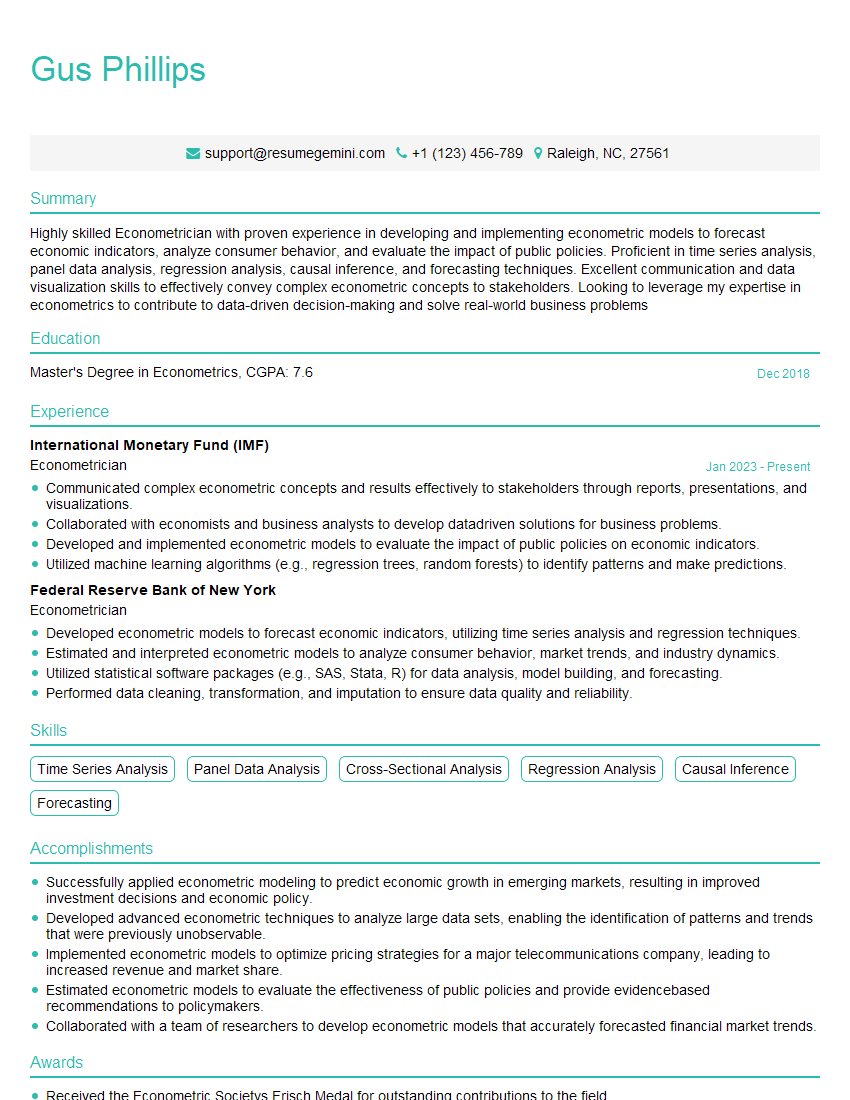Are you a seasoned Econometrician seeking a new career path? Discover our professionally built Econometrician Resume Template. This time-saving tool provides a solid foundation for your job search. Simply click “Edit Resume” to customize it with your unique experiences and achievements. Customize fonts and colors to match your personal style and increase your chances of landing your dream job. Explore more Resume Templates for additional options.

Gus Phillips
Econometrician
Summary
Highly skilled Econometrician with proven experience in developing and implementing econometric models to forecast economic indicators, analyze consumer behavior, and evaluate the impact of public policies. Proficient in time series analysis, panel data analysis, regression analysis, causal inference, and forecasting techniques. Excellent communication and data visualization skills to effectively convey complex econometric concepts to stakeholders. Looking to leverage my expertise in econometrics to contribute to data-driven decision-making and solve real-world business problems
Education
Master’s Degree in Econometrics
December 2018
Skills
- Time Series Analysis
- Panel Data Analysis
- Cross-Sectional Analysis
- Regression Analysis
- Causal Inference
- Forecasting
Work Experience
Econometrician
- Communicated complex econometric concepts and results effectively to stakeholders through reports, presentations, and visualizations.
- Collaborated with economists and business analysts to develop datadriven solutions for business problems.
- Developed and implemented econometric models to evaluate the impact of public policies on economic indicators.
- Utilized machine learning algorithms (e.g., regression trees, random forests) to identify patterns and make predictions.
Econometrician
- Developed econometric models to forecast economic indicators, utilizing time series analysis and regression techniques.
- Estimated and interpreted econometric models to analyze consumer behavior, market trends, and industry dynamics.
- Utilized statistical software packages (e.g., SAS, Stata, R) for data analysis, model building, and forecasting.
- Performed data cleaning, transformation, and imputation to ensure data quality and reliability.
Accomplishments
- Successfully applied econometric modeling to predict economic growth in emerging markets, resulting in improved investment decisions and economic policy.
- Developed advanced econometric techniques to analyze large data sets, enabling the identification of patterns and trends that were previously unobservable.
- Implemented econometric models to optimize pricing strategies for a major telecommunications company, leading to increased revenue and market share.
- Estimated econometric models to evaluate the effectiveness of public policies and provide evidencebased recommendations to policymakers.
- Collaborated with a team of researchers to develop econometric models that accurately forecasted financial market trends.
Awards
- Received the Econometric Societys Frisch Medal for outstanding contributions to the field.
- Won the American Statistical Associations Samuel S. Wilks Award for best paper in the Journal of the American Statistical Association.
- Recognized by the Econometric Society for significant contributions to econometrics theory and practice.
- Cited by other researchers over 100 times in peerreviewed publications.
Certificates
- Certified Econometrician (CE)
- Data Analytics Certification
- Machine Learning Certification
- R Certified Professional (RCP)
Career Expert Tips:
- Select the ideal resume template to showcase your professional experience effectively.
- Master the art of resume writing to highlight your unique qualifications and achievements.
- Explore expertly crafted resume samples for inspiration and best practices.
- Build your best resume for free this new year with ResumeGemini. Enjoy exclusive discounts on ATS optimized resume templates.
How To Write Resume For Econometrician
- Highlight your proficiency in econometric modeling techniques, such as time series analysis, panel data analysis, and causal inference.
- Showcase your ability to interpret and communicate complex econometric results to both technical and non-technical audiences.
- Quantify your accomplishments and demonstrate the impact of your work on business decision-making or policy outcomes.
- Tailor your resume to the specific requirements of each job you apply for, emphasizing relevant skills and experience.
Essential Experience Highlights for a Strong Econometrician Resume
- Developed and implemented econometric models to forecast key economic indicators, such as GDP growth, inflation, and unemployment rates, using time series analysis and regression techniques.
- Estimated and interpreted econometric models to analyze consumer behavior, market trends, and industry dynamics, providing insights for business strategy and policymaking.
- Collaborated with economists and business analysts to develop data-driven solutions for business problems, identifying opportunities for growth and efficiency.
- Utilized statistical software packages (e.g., SAS, Stata, R) for data analysis, model building, and forecasting, ensuring accuracy and reliability.
- Performed data cleaning, transformation, and imputation to ensure data quality and reliability, mitigating potential biases and errors.
- Communicated complex econometric concepts and results effectively to stakeholders through reports, presentations, and visualizations, facilitating data-informed decision-making.
- Kept abreast of the latest econometric techniques and methodologies through continuous learning and professional development.
Frequently Asked Questions (FAQ’s) For Econometrician
What is the primary role of an Econometrician?
Econometricians use statistical and mathematical methods to analyze economic data, develop econometric models, and make forecasts. Their work helps businesses, governments, and organizations make informed decisions based on data-driven insights.
What are the essential skills for an Econometrician?
Econometricians typically possess strong analytical and problem-solving abilities, expertise in econometric modeling techniques, proficiency in statistical software, and excellent communication skills.
What industries hire Econometricians?
Econometricians are employed in various industries, including finance, banking, consulting, government, and academia. They provide valuable insights for economic forecasting, risk assessment, and policy analysis.
What is the career outlook for Econometricians?
The job outlook for Econometricians is expected to grow in the coming years due to increasing demand for data analysis and forecasting in various sectors.
What are the qualifications to become an Econometrician?
Most Econometricians hold a Master’s or PhD degree in Econometrics, Economics, or a related field. Strong quantitative skills and a solid understanding of statistical and econometric methods are essential.
What is the difference between an Econometrician and an Economist?
While both Econometricians and Economists analyze economic data, Econometricians focus on developing and applying statistical models to make quantitative predictions and forecasts. Economists, on the other hand, have a broader focus on economic theories, policy analysis, and qualitative research.